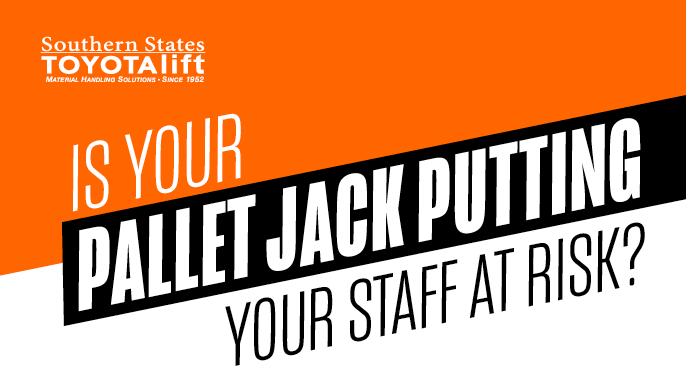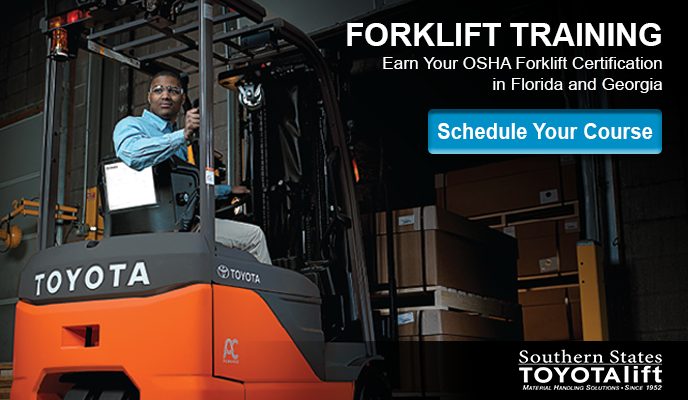Is Your Pallet Jack Putting Your Staff at Risk?
by James Averitt, on Jun 9, 2023 11:45:00 AM

In 2020, more than 240,000 musculoskeletal injuries were reported in the workplace. More than a third of all these injuries occurred while the worker moved material. Even light loads can cause injuries when the equipment, like manual pallet jacks, offers little operator protection. On the other hand, electric pallet jacks allow your team to move more products faster and safer. Learn how investing in an electric pallet jack improves safety and protects your small business from costly fines.
Serious Injuries Are More Common Than You Think
74% of the 240,000 musculoskeletal injuries mentioned above were back injuries from overexertion. Improper lifting, repetitive tasks, and other load-bearing activities were the most common causes of this injury. The average victim missed 14 days of work, with over 35% of cases missing more than 31 days. To make matters worse, those injuries cost the business $42,000 on average. This cost US businesses billions of dollars in medical expenses, worker’s compensation claims, and OSHA fines in 2020 alone.
That's a lot of statistics to throw at you, but it all boils down to one indisputable fact. Your staff puts themselves and your business at risk whenever they move products without protective lifting equipment.
Manual Is More Dangerous Than Electric
With proper lifting equipment, you can protect your staff from these injuries and improve overall warehouse safety. In fact, facilities that use preventative measures, like protective lifting equipment, reduce injuries and associated costs by up to 40%.
The key word there is protective. Investing in equipment that simply allows your workers to lift larger loads does not necessarily keep them safe. That’s the issue with manual pallet jacks.
Typical manual pallet jacks allow operators to lift loads up to 5,500 lbs. However, that does not guarantee they can safely move a load of that size. Manual pallet jacks don't offer any braking or movement assist, meaning the operator must use their strength to move and stop these units.
This leads to musculoskeletal injuries when workers attempt to move loads too heavy for their build or when they attempt to stop a load that is moving too quickly. This causes sprains, strains, and tears but can also break bones. An average pallet of soda, for example, weighs between 1,600 and 2,500 lbs. That’s more than enough to break bones and damage your facility if the operator loses control of the pallet jack.
Electric Pallet Jacks Prioritize Worker Safety
Electric pallet jacks (sometimes called EPJ, power pallets jacks or motorized pallet jacks) offer more than just lifting power. Models like Toyota's Tora-Max Electric Walkie line use onboard power to move and stop heavy loads without straining the operator.
The 2TWB33, for example, is a Toyota electric pallet jack that includes an AC drive motor capable of lifting and moving up to 3,300 lbs. The ergonomic operator controls make lifting loads nearly effortless. The operator does not need to push or pull the load weight. They only need to steer the pallet jack and let the 24-volt electrical system handle the rest. Stopping fully weighted loads is just as easy with the jack's regenerative braking system. This system not only halts motion quickly but uses reclaimed energy to extend the battery's run time. These features make operation more comfortable, but they also protect your staff from injury and your business from costly accidents.
Find the Pallet Jack That’s Right For You
EPJs come in a wide array of designs and sizes. This includes models with load capacities as light as 2,000 lbs or as heavy as 4,500 lbs. So whatever your need, there is an electric pallet jack to fit the task. That’s where we can help. Our Solutions Team offers expert advice on the best lifting equipment for your application that keeps your staff safe without breaking the budget. To learn more about Toyota’s line of Tora-Max Electric Walkie Pallet Jacks or any of our material handling equipment, contact us online or visit one of our helpful locations throughout Georgia and Florida.
Florida
Jacksonville
Lakeland
Ocala
Orlando
Tampa
Winter Haven
Georgia
Albany
Macon
Columbus
Valdosta
Further Reading
5 Simple Steps to Improve Warehouse Safety
3 Ways To Avoid Increased OSHA Fines
Different Types of Forklifts – OSHA Classifications Explained









